Family Tree Updates
Check back monthly for new updates to this family tree!
Paternal Family Line
Maternal Family Lines
Maternal Line By Name
WEBSITE VISITORS
Comments
blog comments powered by Disqus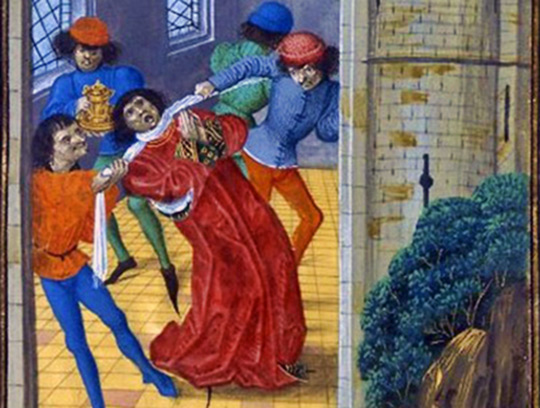
Lady Eleanor de Bohun
Maternal 17th Great Grandparents of David Pierce Rodriguez
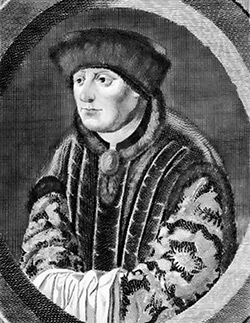 Sir Thomas of Woodstock, KG
Sir Thomas of Woodstock, KG
- 1st Duke of Gloucester
- Lord High Constable (1372–1397)
- Justice of Chester (1388–1391)
- Earl of Essex (1376–1397)
- Earl of Buckingham (1377–1397)
- Duke of Gloucester & Duke of Aumale (1385–1397)
- Knight of the Garter (KG)
- Leader of the Lords Appellant, a group of powerful nobles whose ambition to wrest power from Thomas's nephew, King Richard II of England
- House: House of Plantagenêt
- Birth: 07 Jan 1355 | Woodstock Palace, Oxfordshire, England
- Death: 08 Sep 1397 | Calais, Pale of Calais, France (aged 42 yrs.)
- Father: King Edward III of England (1312-1377)
- Mother: Philippa de Hainault, Queen consort of England (1314-1369)
- The fourteenth and youngest child of Edward III of England and Philippa of Hainault.
- The fifth of the five sons of King Edward III who survived to adulthood.
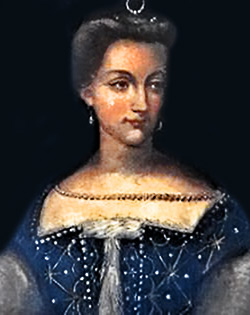 Lady Eleanor de Bohun
Lady Eleanor de Bohun
- Countess of Essex
- Countess of Buckingham
- Duchess of Gloucester
- Duchess of Aumale
- Birth: c. 1366 | Hereford, Herefordshire, England
- Death: 3 Oct 1399 | London, England (aged c. 32-33 yrs.)
- Burial: Westminster Abbey, London
- Father: Humphrey de Bohun, 7th Earl of Hereford, 6th Earl of Essex, 2nd Earl of Northampton, KG
- Mother: Lady Joan Fitzalan, Countess of Hereford, Countess of Essex and Countess of Northampton
- Invested as a Lady Companion, Order of the Garter in 1384.
- She became a nun sometime after 1397 at Barking Abbey.
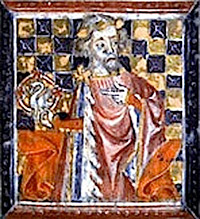 When John of Gaunt died in 1399, Richard disinherited Henry of Bolingbroke, who invaded England in response with a small force that quickly grew in numbers and, meeting little resistance, he deposed Richard to have himself crowned Henry IV of England. Richard died in captivity early the next year and was probably murdered, bringing an end to the main Plantagenet line. Henry's accession by force broke the principles of Plantagenet succession; from this point any magnate with sufficient power and Plantagenet blood could consider the throne.
When John of Gaunt died in 1399, Richard disinherited Henry of Bolingbroke, who invaded England in response with a small force that quickly grew in numbers and, meeting little resistance, he deposed Richard to have himself crowned Henry IV of England. Richard died in captivity early the next year and was probably murdered, bringing an end to the main Plantagenet line. Henry's accession by force broke the principles of Plantagenet succession; from this point any magnate with sufficient power and Plantagenet blood could consider the throne.
Thomas of Woodstock was the leader of the Lords Appellant, a group of powerful nobles whose ambition to wrest power from Thomas's nephew, King Richard II of England, culminated in a successful rebellion in 1388, which significantly weakened the king's power. Richard II managed to dispose of the Lords Appellant in 1397, and Thomas was imprisoned in Calais to await trial for treason. During that time he was murdered, probably by a group of men led by Thomas de Mowbray, 1st Duke of Norfolk, and Nicholas Colfox, presumably on behalf of Richard II. This caused an outcry among the nobility of England that is considered by many to have added to Richard's unpopularity.
Thomas of Woodstock was the fifth and final surviving son of King Edward III and was twenty-five years younger than the king's eldest son, Edward the Black Prince, and even fourteen years younger than the fourth son, Edmund of Langley. As the youngest son, Thomas did not achieve anything close to the influence his elder brothers did during the latter part of their father's reign and was dependent on the king finding him a suitable marriage. This marriage took place in 1374 to Eleanor de Bohun, daughter and co-heiress to the wealthy Earl of Hereford and Essex. The inheritance also brought with it the position of constable of England, which Thomas assumed in 1376. After the death of Edward III (1377), Thomas was created Earl of Buckingham just before the coronation of his nephew, the new King Richard II. The new title did bring him a higher income, but the income was based on several territories under English control in France, which fully explains why Thomas was always keen on war, rather than peace, with the French. Over the next several years, Thomas participated in several military expeditions to Brittany and with his elder brother, John of Gaunt, Duke of Lancaster, to Scotland. All expeditions did nothing to give Thomas any sort of a reputation as a warrior, as his father and eldest brother were, and may as well never have happened. After these failed expeditions, Thomas drew his attention to English politics and it would be in this "battlefield" that he would truly make a name for himself.
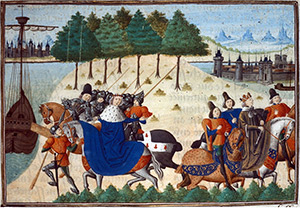 By the mid-1380s, as Richard II was on the verge of coming of age (he had taken the throne when only ten years old), it was becoming increasingly clear that he was a thoughtless, frivolous and wasteful leader. One would not assume at the time that Thomas and the king were at odds, considering the fact that Richard had created his uncle Duke of Gloucester (1385), but the new duke ultimately became the leader of the opposition party against his nephew's shabby governing. The primary complaint was that the king was showing favor to a small group of personal favorites, such as Michael de la Pole and Robert de Vere (who the king would create Duke of Ireland), while he ignored the sounder advice of his uncles and other members of the nobility. While John of Gaunt was in the country, Richard had nothing to worry about. But, with John away in Castile on a military expedition, Gloucester was free to assert himself. He did so by forming a group called the Lords Appelant, who claimed they were only attempting to "appeal" to Richard II to govern the realm more responsibly. The group also consisted of fellow disgruntled nobles the Earls of Warwick and Arundel, as well as the younger Thomas Mowbray and Henry Bolingbroke, the latter of which was John of Gaunt's son and heir. Tensions brewed until they erupted in late 1387 when the lords and the royal favorites won a brief (and relatively bloodless) battle against the royal favorites at Radcot Bridge.
By the mid-1380s, as Richard II was on the verge of coming of age (he had taken the throne when only ten years old), it was becoming increasingly clear that he was a thoughtless, frivolous and wasteful leader. One would not assume at the time that Thomas and the king were at odds, considering the fact that Richard had created his uncle Duke of Gloucester (1385), but the new duke ultimately became the leader of the opposition party against his nephew's shabby governing. The primary complaint was that the king was showing favor to a small group of personal favorites, such as Michael de la Pole and Robert de Vere (who the king would create Duke of Ireland), while he ignored the sounder advice of his uncles and other members of the nobility. While John of Gaunt was in the country, Richard had nothing to worry about. But, with John away in Castile on a military expedition, Gloucester was free to assert himself. He did so by forming a group called the Lords Appelant, who claimed they were only attempting to "appeal" to Richard II to govern the realm more responsibly. The group also consisted of fellow disgruntled nobles the Earls of Warwick and Arundel, as well as the younger Thomas Mowbray and Henry Bolingbroke, the latter of which was John of Gaunt's son and heir. Tensions brewed until they erupted in late 1387 when the lords and the royal favorites won a brief (and relatively bloodless) battle against the royal favorites at Radcot Bridge.
Early the following year, at the so-called Merciless Parliament, the lords passed judgment on a number of the king's favorites, many of whom were exiled or executed, and it is widely believed that the king himself was briefly deposed (for about two to three days), before the lords decided it was better to reinstate him and use him as their own personal puppet. The most significant part of the Merciless Parliament, however, would turn out to be Gloucester's insistence on the execution of one Simon Burley, a favorite of the king's who most would agree was a decent man and who by no means deserved to have his head hacked off. Mowbray and Bolingbroke, the two younger appellants, as well as the Duke of York, the king's other uncle, all protested against Burley's death. In the end, their words were unheeded by Gloucester and Burley was executed. Though the king was powerless to do anything at the moment, he would never forgive his uncle for Burley's execution and, for the next nine years, would bide his time and wait to take his revenge.
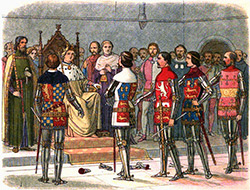 The lords maintained power for a number of months after their "coup" but soon became as unpopular as the king's favorites had become and Richard II was able to wrestle back power from them with the help of John of Gaunt, who had returned to England by this point. In the years leading up to 1397, the king lived in relative peace with his former enemies and Gloucester, though his influence at court was limited, received a number of royal rewards and accompanied the king on the successful Irish expedition (1394). However, as talks of peace resumed between England and France, Gloucester became the most outspoken critic (because, of course, of the income he stood to lose from his French interests). This opinion gained him much popularity amongst the commons, who all bitterly hated France, but earned him little praise from the king and the other royal uncles. Nonetheless, a lengthy truce was signed between England and France, sealed by the marriage of Richard II and Isabella, the young daughter of the French King Charles VI (1396; Richard's first wife had died in 1394).
The lords maintained power for a number of months after their "coup" but soon became as unpopular as the king's favorites had become and Richard II was able to wrestle back power from them with the help of John of Gaunt, who had returned to England by this point. In the years leading up to 1397, the king lived in relative peace with his former enemies and Gloucester, though his influence at court was limited, received a number of royal rewards and accompanied the king on the successful Irish expedition (1394). However, as talks of peace resumed between England and France, Gloucester became the most outspoken critic (because, of course, of the income he stood to lose from his French interests). This opinion gained him much popularity amongst the commons, who all bitterly hated France, but earned him little praise from the king and the other royal uncles. Nonetheless, a lengthy truce was signed between England and France, sealed by the marriage of Richard II and Isabella, the young daughter of the French King Charles VI (1396; Richard's first wife had died in 1394).
The following year, Richard II decided to take revenge on the three senior lords appellant and subsequently had Warwick, Arundel and Gloucester arrested and charged with treason. It is by no means clear as to why the king finally decided to destroy the appellants (rumors were spread that they were planning on deposing him) but the most likely scenario is that Richard finally felt strong enough to overpower the men who had made him look so foolish, and had killed many of his favorites, nine years earlier. No action was taken against Bolingbroke and Mowbray, the two junior appellants (making their decision to protest against Burley's execution a wise move) and Gloucester was put in the custody of the latter at the prison in Calais. In the ensuing Parliament, Arundel was executed and Warwick was exiled. When it came time for Gloucester to stand trial, it was announced that he was already dead. The events surrounding Gloucester's death are shrouded in mystery to this very day, over six hundred years later. Although it was rumored that Gloucester was sick at the time of his arrest, and that he died of that sickness while imprisoned in Calais, most contemporaries and modern historians alike will agree that he was murdered under orders from Richard II himself and that Mowbray or his associates were the ones who were directly responsible for the murder, which supposedly happened via suffocation. Mowbray died in exile in 1399 but during Henry IV's first Parliament later that year, one John Hall, a servant of Mowbray's, confessed to Gloucester's murder and was promptly executed. The confession must be taken with a grain of salt though because Hall was almost certainly tortured into confessing. Even so, it was far too late to save Gloucester who will always stand as a prime example of a man brought down by his own ambition.
References
Tuck, Anthony. ‘Thomas , duke of Gloucester (1355–1397)’, Oxford Dictionary of National Biography, Oxford University Press, Sept 2004; online edn, Jan 2008 [http://www.oxforddnb.com/view/article/27197, accessed 28 June 2010]
Children of Thomas of Woodstock & Eleanor de Bohun
Thomas of Woodstock had by his wife Eleanor the following five children:
- Humphrey, 2nd Earl of Buckingham (c. 1381-2 September 1399)
- Anne of Gloucester (c. 1383-1438) who married thrice:
- Thomas Stafford, 3rd Earl of Stafford;
- Edmund Stafford, 5th Earl of Stafford;
- William Bourchier, 1st Count of Eu (1374-1420) - Joan (1384 - 16 August 1400) married Gilbert Talbot, 5th Lord Talbot (1383-1419). She died in childbirth.
- Isabel (12 March 1385/1386 - April 1402)
- Philippe (c. 1388), died young
